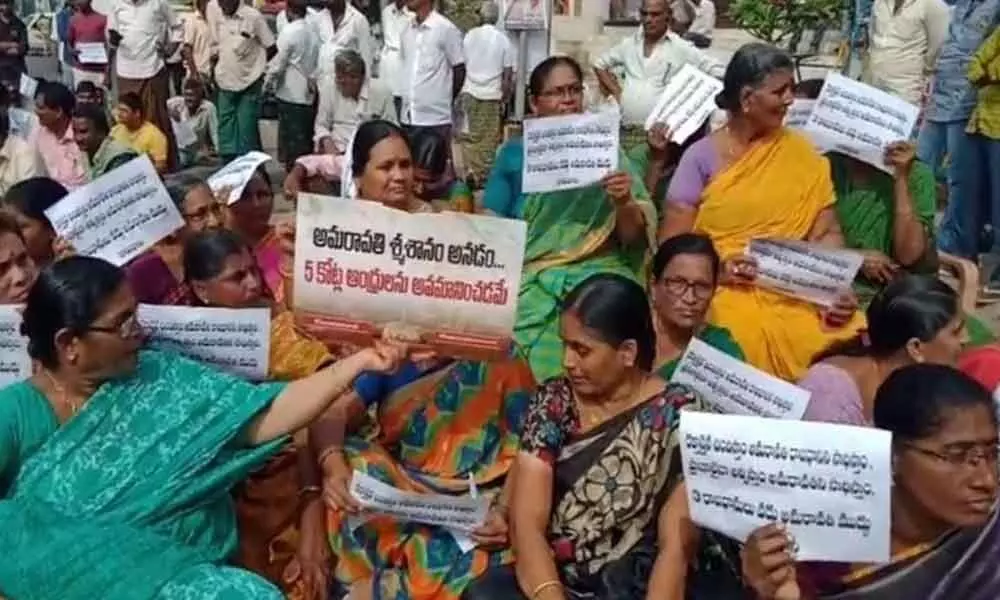Amaravati capital farmers' fate hangs in balance

Amaravati capital farmers’ fate hangs in balance
Farmers in Andhra Pradesh never took to streets as in the case of some northern States. We have seen how farmers of Haryana had protested in Delhi for their demands and got justice
Farmers in Andhra Pradesh never took to streets as in the case of some northern States. We have seen how farmers of Haryana had protested in Delhi for their demands and got justice. We have seen how farmers of Tamil Nadu protested in Delhi and how the government finally came up with a solution. We have seen how Gujjars had protested in Rajasthan demanding five percent reservation in jobs and how the government was forced to act.
But the Andhra farmers who are known for nonviolent protests have completed 250 days of agitation with the slogan 'Save Amravati, Save Andhra Pradesh,' still feel left out with no response from the government. They have been on relay hunger strike opposing the move of the State government to implement the three-capital formula.
Not just the farmers, even NRIs and the Opposition parties and various civil society organisations also extended their support to this agitation. Everyone has his own logic to argue about whether or not the residuary State of Andhra Pradesh should have three capitals. But the issue here is not just the capital.
It is an issue which needs to be examined impartially. Though some States were divided in the past, never did this kind of situation arise. There were no Pedamma's and Chinnamma's (Sonia Gandhi and late Sushma Swaraj) to claim the credit for successful bifurcation and there was no Act made to divide a State. For the first time, AP State Re-Organisation Act 2014 was passed amidst high drama in Parliament. After bifurcation, the residuary State of AP was left without a capital city.
When the new coalition government, (TDP-BJP) came to power both at the Centre and in the State, a unanimous resolution was passed in the Assembly to establish the capital city in Amravati. YSRCP and BJP were party to it. The then leader of the Opposition YS Jagan Mohan Reddy said that 33,000 acres of land should be there for the capital city.
It was time for land acquisition to attract major projects both in the private and public sector. Though it took nearly two years to acquire the land due to several political reasons and legal hurdles, the fact remains that the farmers voluntarily gave away their lands for Amaravati. This made headlines and everyone started visualising a dream capital.
The land pooling concept in Amaravati was hailed as a great model for development in India by several experts. It gained greater importance when the Prime Minister himself carried earth and Yamuna water from Delhi and laid the foundation stone for the capital.
But six years later, farmers are now staring at uncertain future as the YSRCP government has passed Bills in the Assembly and got the nod of the Governor to have three decentralised capitals. Visakhapatnam as executive capital, Amaravati as legislative capital and Kurnool as judicial capital —, the farmers, anxious over their fate, have spilled onto the streets.
The hope of farmers to have a modern capital has gone haywire. They feel they have lost their land and the future of their next generations as well. "A socio-political and economic model that should have been the pride of Andhra Pradesh is now in tatters," the farmers rue.
The government says that justice will be done to the farmers. But how no one knows yet. The land cannot be given back to them since roads have come up on the lands given by farmers, plots have been given on other lands. The agriculture land has become fallow. The farmers who gave away their lands as part of a social contract without receiving immediate compensation are now in doldrums.
That is why the 250-day old agitation has assumed importance. If the impasse is not resolved, then the land pooling concept in Amaravati which was hailed as a great model will become a major lesson for the people particularly the farmers and in future no one would come forward for voluntary participation in nation building exercise.








